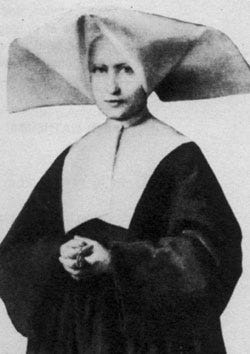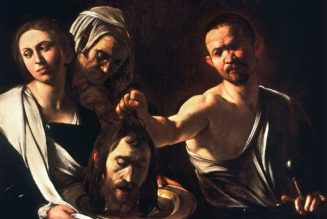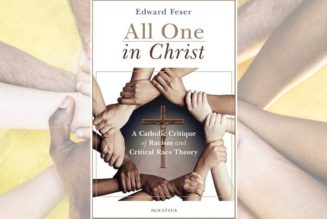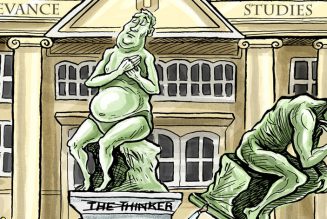Hey everybody,
I am sorry this newsletter is a bit late. Just before I pressed send, we confirmed some details of a story making news all over the Church — and you can read to the end, or skip to the end, if you want to start with that.
Today is the feast of St. Catherine Labouré, a French religious sister who was also a Marian visionary — and who is responsible for the Miraculous Medal, probably the most commonly worn image of Mary in the world.
Here’s what happened, according to Labouré’s accounts. On July 19, 1830, Sr. Catherine woke up from a sleep, reportedly after hearing a child’s voice calling her to the chapel. There in prayer, she said, the Blessed Virgin Mary told her that God would charge her with a mission — and that she should trust in both the Lord and her spiritual director.
A few months later, when she was in the chapel that November, Labouré said she saw the Blessed Virgin Mary, who appeared standing on a globe, with rays of light around her, and framed by the words: “O Mary, conceived without sin, pray for us who have recourse to thee.”
Labouré said that the Blessed Mother asked her to bring the images to her spiritual director, along with a vision she saw for the reverse side of the medal -— and to tell him that the images should be made into a religious medal.
She did all of that. But here’s the remarkable part — when it went down, Sr. Catherine was a novice, not even yet a professed member of her religious community. She was also 24 years old. And the vision of the Blessed Virgin Mary was not her first extraordinary experience: she had also said, just a few months earlier, that she had seen the heart of St. Vincent de Paul on three consecutive nights, when her community venerated a relic of his right arm. And in June, she said she had a vision of the jewels falling from the crown of Christ the King — she took this to mean that the French monarchy would fall, which it did.
In light of all of that, the role of her spiritual director is key in what happened next. When St. Catherine brought him her account of the Blessed Virgin Mary, he could have easily dismissed it as — at best — the imagination of a young novice who seemed eager for a very vivid interior life.
You can’t tell St. Catherine’s story without also talking about the pastoral wisdom of Fr. Jean Marie Aladel, C.M., who was only 30 or 31 when all of this went down.
See, rather than act too quickly on Sr. Catherine’s alleged visions, or dismiss them entirely out of hand, Fr. Aladel initially told Catherine to put it out of her mind — as he’d done with her other reported visions.
After a while, seeing that she seemed to be trying to do that, Fr. Aladel asked Sr. Catherine, very cautiously, to pray for clarity on what the Blessed Mother would like on the back of the medal. She eventually came back with an answer.
Then he waited months longer, watching Sr. Catherine, discerning her spiritual life, acting cautiously.
Eventually, according to Sr. Catherine, the Blessed Mother appeared to her again — well more than a year after her initial vision — asking about the medal. Sr. Catherine explained to Mary that her spiritual director seemed not to believe her.
The Blessed Mother told the young nun not to worry, that the priest would come around, that “he is my servant, and he would not wish to displease me.”
Sr. Catherine told all that to Fr. Aladel.
And, again, he could have dismissed it as the pushiness of a young novice with a plan, or a goal, or a delusion of grandeur. But because he had spent so much time getting to know her, observing her spiritual life, observing her apostolic and community life, he believed her.
The integrity of her life confirmed her spiritual claims.
Fr. Aladel took the whole thing to the Archbishop of Paris, and soon after, the first medals were struck. Eventually, devotion to them spread around the world.
Here’s the part to take away, I think, for all of us: Her ordinary holiness attested to her extraordinary claims.
That’s the part germane to each of us.
Whatever we say about the Lord, or whatever claims we make about the grace of his Church, will be credible if we’re credible — integrity of life is the most important witness to Christ, because it corroborates and confirms our claims of the Gospel.
What we say is measured by who we are.
May St. Catherine Labouré pray for us.
And by the way — as religious veils go, St. Catherine Labouré has the coolest:
I’d be remiss if I didn’t also mention that important fact.
Now, here’s what you need to know.
The news
But some key German leaders say they’re not convinced the Vatican is right about that.
And on it goes.
Urging a reversal of the policy, Rhoades said that “the desire of St. Mary’s College to show hospitality to people who identify as transgender is not the problem. The problem is a Catholic woman’s college embracing a definition of woman that is not Catholic.”
For its part, the administration at St. Mary’s College has insisted that this is nothing new — that several U.S. Catholic women’s colleges admit both women and those who live or identify as women.
We checked some admissions policies, and that’s true — there are several with policies like that.
But Rhoades seems to be the first bishop to speak out on the issue — with at least one other diocese saying that Catholic colleges “determine their policies on their own.”
So clearly, there are different approaches among bishops to this emerging issue. Will any of them spur the change that Rhoades wants to see? That remains to be seen.
Read all about it, right here.
While he waits, Becciu has taken to the airwaves and newspapers of Italy for something of a Nixon moment — insisting furiously in interviews that he is not a crook.
It seems to me that his media activity telegraphs some anxiety on the part of the cardinal. If he really expected to be acquitted — as he says he does — I’d expect him to sit tight for the moment, and do his media tour after he was vindicated.
So it’s possible that his current activities are a way of framing the narrative ahead of a conviction he’ll oppose.
In either case, in a point-by-point analysis, Ed took a look at Becciu’s recent claims, and how they stack up to the evidence in court.
At issue is that Polish Archbishop Stanisław Gądecki had written a letter to Pope Francis about Germany’s “synodal way” process.
In a very sharp letter published in a Polish newspaper Sunday, German Bishop Georg Bätzing called that decision “very unsynodal and unfraternal behavior.”
A clash between Polish and German bishops has been in the making for years now — probably for the last decade, at least. Now it’s coming to a head.
And The Pillar’s Luke Coppen explains it all.
—
—
Next, The Pillar interviewed last week Elena Zhemkova, the founder of Memorial, a human rights organization which, until 2022, documented stories of religious persecution in the Soviet Union.
In that year, the organization was shut down by the Russian state in 2022, with central figures jailed in Russia, or exiled.
In the same year it was shut down — 2022 — it won the Nobel Peace Prize.
Not a person of faith herself, Zhemkov talked with The Pillar about the significance of religious persecution in oppressive regimes.
“Once a person has lost their faith, it is much easier to break them,” she told The Pillar.
In the Soviet Union, “faith made a huge difference. People with faith had much more strength to overcome the situation and survive. I think that faith was what sustained them and gave them strength. In the Soviet Union, many people lost their faith, and that was the aim of the system — they were sent to the Gulag to lose their faith, and the Gulag was very successful in that regard.”
So why has her organization been shut down? Why is she living in exile?
—
Finally, a story from our ongoing “Solutions” series — in which we look at how ordinary parishes are approaching real problems.
At St. Petronille Parish in Glen Ellyn, Illinois, “Mary’s Closet” has become a boutique for local families — with clothes, shoes, kids and baby stuff, and lots of home goods too.
It’s not a boutique, though, because while it’s set out like a store, everything at Mary’s Closet is free.
And when families come, parishioners also help them get set up for food assistance, and can connect them with other social service providers.
The ministry of Mary’s Closet involves about 35 people each week — who bring “new baby baskets” to local families, facilitate donations, and stock the shelves. They also drive “customers” to Mary’s Closet, or deliver things like diapers, when they’re needed.
The ministry hasn’t been easy to sustain — but it’s become a big part of parish life. And parishioners have learned a lot about needs, even in their relatively “affluent community.”
So how do they do it? Could your parish pull it off?
Cardinal Ray and El Rey
A lot of Catholics are talking this week about a report that began on an Italian news site just a day or two ago, and has since taken on a life of its own — including a report by the Associated Press this morning, which says it has confirmed the story.
The report is that Pope Francis has “punished” — as the AP put it — Cardinal Raymond Burke, by cutting off his Vatican salary and pulling his subsidized Vatican apartment.
According to the AP, the pope told Vatican officials last week that he was doing that because Burke is a source of “disunity” in the Church.
Moments before I pressed send on this newsletter, The Pillar confirmed several elements of the story.
The Pillar has confirmed that there was a Vatican meeting last week, at which Pope Francis discussed a punitive measure, pertaining to Cardinal Burke’s stipend and apartment, mentioning specifically that Cardinal Burke has been a source of “disunity” in the Church.
It was not clear to our sources-close-to-the-situation whether the measure would include both apartment and stipend — but since the stipend goes to cardinals living in Rome, if Burke loses the apartment and leaves Rome, he also loses the stipend.
The Pillar has also confirmed that Burke has not been informed directly of the decision.
Burke, I suspect, will take it rather quietly.
The cardinal is an outspoken critic of Pope Francis, and has generated a fair amount of controversy for his approach.
But while he speaks out vociferously on ecclesiastical issues as he sees them, Burke does not have the temperament to speak out on a personal slight — in fact, I’ve been in his company several times in recent years, and I’ve not heard him speak ill of the pope personally, or of his decisions to remove Burke from the leadership positions he once held.
As it happens, I’ve seen Burke grow visibly uncomfortable in the presence of Catholics insulting Francis personally, rather than criticizing the pontiff’s theological approach or leadership style.
He has that kind of personal piety, in my observation, which makes the idea of denigrating the person of the pope very uncomfortable — even while he is absolute — and sometimes strident — in his criticisms of Francis’ approach to some issues.
That seems a distinction which matters to him.
At any rate, the cardinal has the care of a shrine in La Crosse, Wisconsin, and a sister there, and I suspect he won’t hurt for money if his Vatican stipend has been cut.
But whether Burke speaks out or not, cardinals will be talking.
And I think even some very moderate, institutionalist cardinals — those who find Burke’s outspokenness distasteful — will regard this papal decision as beyond the pale.
The very institutionalism which makes them uncomfortable with Burke will likely leave them to conclude of Francis’ move that things just aren’t done this way in the Church.
I suspect the move will be seen by curial cardinals, especially, as a bridge too far — that popes should not be in the business of arbitrarily exercising their unfettered power to punish a critic.
There may be some cardinals who think it is an appropriate response to a persistent critic of the pope. There will be ultramontane observers who think it’s “based.”
But to others — including some cardinals who were persistent critics of Benedict or John Paul II — it will likely seem to be a nakedly vindictive choice.
I do not think it will serve to quell other would-be cardinalatial critics. It might have something of a chilling effect in public. But it will likely have cardinals roiling behind closed doors — and I suspect instead it will embolden papal critics, galvanize them, or create them.
It could suggest, I think, even to the very moderate cardinals, that when the pope no longer likes them, he will pull the rug from under them, and quickly.
That they can not operate with stability in office. That while they might enjoy the pope’s favor at the moment, losing it would mean losing even their homes.
There will be, undoubtedly, comparisons to John Paul II and Benedict XVI, who tended to be fairly magnanimous toward their cardinalatial critics, even bestowing upon them very significant diocesan sees and Vatican dicasteries.
In short, I think there will be objections to this decision from even the most moderate and institutionalized corners of the Roman College.
And I suspect that it will catalyze more quiet discussions about a future conclave — and what kind of man should be in power — than Pope Francis likely expects. For some, it will seem to encourage a candidate who respects the customs and traditions of the Apostolic See. For others, it will discourage any cardinal who is seen as close to the pope.
The Bard expressed in “Measure for Measure” a sentiment that I expect will be echoed among the Vatican’s cardinals:
He who the sword of heaven will bear
Should be as holy as severe;
Pattern in himself to know,
Grace to stand, and virtue go;
More nor less to others paying
Than by self-offences weighing.
—
Anywho, don’t forget that what we say is measured by who we are.
Please be assured of our prayers, and please pray for us — we need it. Especially as we work on some critical stories this week.
“O Mary, conceived without sin, pray for us who have recourse to thee.”
Sincerely yours in Christ,
JD Flynn
editor-in-chief
The Pillar
Comments 76
Services Marketplace – Listings, Bookings & Reviews













